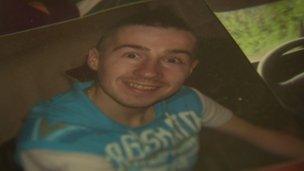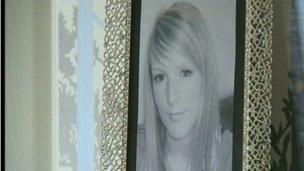Eating disorders: Sufferers unaware condition can be 'fatal'
- Published
The family of a Belfast man who died due to an eating disorder urge people with the condition to seek help.
The families of two young people who died from an eating disorder say sufferers do not realise the condition can be fatal.
It is hard to gauge how many people die from anorexia and bulimia as death certificates normally record heart or kidney failure instead.
Laurence Nugent, 24, from Belfast, kept his eating disorder a secret for years before confiding in his mother.
He died from a heart attack after suffering from bulimia.
'Suicidal'
His mother, Pamela, said at first his family did not realise how serious the disorder was.
"We weren't in despair at the beginning. We thought we'll get him help, we'll fix it as mummies and daddies do, but as time progressed we realised this is very serious," she said.
"It was a mental health issue. His personality started to take the form of someone who was depressed, who was very angry, very afraid and suicidal.
"But we never thought in one million years that Laurence would die."
But Laurence did die, after years of bulimia and starvation began taking their toll on his body.

Laurence Nugent died of a heart attack after suffering from bulimia for years
'Normal'
Mrs Nugent said: "We didn't know who to turn to for help because Laurence wouldn't allow us.
"It was his secret - he was totally ashamed of himself and he hated himself. He told us he hated the very look of himself."
Laurence kept his secret within his immediate family, but continued to live what looked like a normal life to those outside the family circle.
His brother, Chris, said many of his friends were shocked to discover the truth.
"After he died we told a lot of his friends what we'd been hiding for so long. They couldn't believe it. They said to me, 'why didn't he tell us? We would have helped him. I can't believe we've known him all this time and we didn't know'."
Mrs Nugent said she feels it is important to let young people know that an eating disorder can be fatal.
She said: "I'm saying to every young man out there in Northern Ireland - this can kill you. It killed my son, you need to get help."
'Starvation'
Danielle O'Neill was also 24 when she died. The fashion designer from Londonderry had only suffered from anorexia for several months.
Her mother, Adelaide, said she developed the condition after starting a diet that went too far.
"She said to me she never meant to get so thin," she said.
"That's the thing I can't stress enough - how big a part your mind plays in this, it's like it takes over and you can't stop."
Danielle had received treatment and was doing well, but her mother said an attempt to eat a normal meal had a terrible effect on her.
"She ended up in hospital on a drip and it seems her stomach ruptured, it just couldn't cope with the food after months of starvation," Mrs O'Neill said.
Mrs O'Neill said losing Danielle was like losing part of herself, but now hopes to raise awareness about eating disorders.
"She's gone and we'll never bring her back, but if this can help somebody else and raise awareness then that would be something good," she said.
The Nugent family are setting up the Laurence Trust, external later this month to highlight the dangers of eating disorders, and to offer support to young men in particular.
Mrs Nugent said: "It's too late for Laurence, but young people need to know the dangers."

Danielle suffered from anorexia and died after her stomach ruptured as it could not cope with food any longer
Jacqui King, from the charity the Eating Disorders Association, said the problem needed to be taken more seriously in Northern Ireland.
"In 12 years of being in EDA I have approached each of the health ministers for a meeting about this and I've never had a meeting yet," she said.
"We do need something more like a day hospital where people could go on a daily basis, where they could have different types of therapy and we definitely do need some in-patient facility, because people are just being put into general medical wards or psychiatric wards.
"There are two people that I know of who are seriously ill (due to eating disorders) but are not being treated for their eating disorder in hospital, only really being kept there to keep them safe."
A spokesperson for the Department of Health said the minister had not received a meeting request from the Eating Disorders Association.
"There have been significant developments in eating disorder services for young people and adults across Northern Ireland in recent years," they added.
"There are specialist community-based eating disorder teams in each health and social care trust area, with the Belfast Trust providing these services for the South Eastern Trust."
If you've been affected by anything in this article you can contact the Eating Disorders Association on 02890 235959 or visit their website, external.
- Published30 January 2014
- Published30 January 2014
- Published29 January 2014